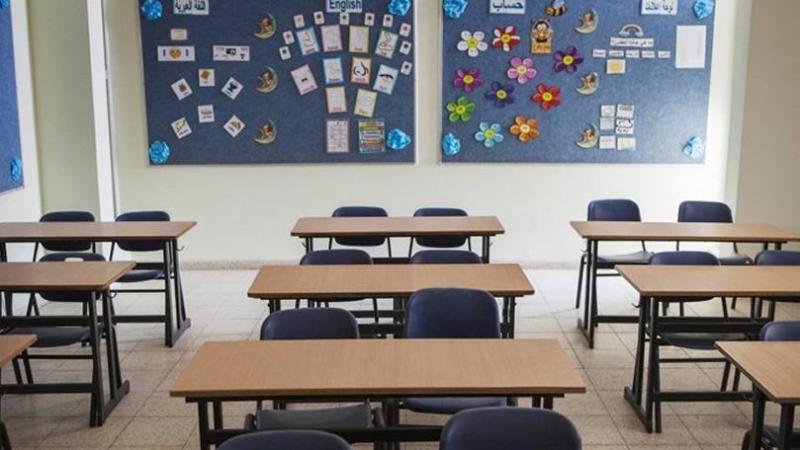A meeting of the unions for vocational and basic education teachers concluded the day before yesterday with the Minister of Education and administrative staff on an agreement to increase the supervision compensation during official exams twofold. In exchange, there are attempts to introduce the notion of not paying half of the salary during the summer months, as this is tied to attendance while teachers are on vacation. A loud tone dominated the conversations between ministry employees and the teachers, represented by their unions' heads, to prevent any questions or objections regarding overdue electoral allowances. At the end of the meeting, there was a rush for a group photo and a race to send WhatsApp messages to confirm incentives that have become more akin to begging and an opportunity to impose norms on the teachers that are contrary to the laws, attempting to create non-existent positive atmospheres to facilitate official exams just as elections were passed through.
This is the atmosphere being exchanged among teachers at the threshold of the official exams, while they still await their compensation for their participation in managing the electoral process.
### A State of Promise Distribution
May has ended, and the second week has passed since state employees completed the parliamentary elections, which would not have been possible without their diverse participation based on different sectors (judiciary, military, or administrative). The state had promised through the Ministries of Interior and Finance to pay their allowances upon the completion of the process, which only became a reality for the military sector; military personnel received their entitlements on the election day morning. Civilian employees, however, received only promises that are losing value as the national currency collapses.
The ministries involved in the electoral process dispensed assurances left and right before the elections. The Minister of Finance met with the secondary education union and stated: "The allowances for participating teachers will not be delayed." The Ministry of Interior promised the employees tasked with disbursing the entitlements as follows: Heads of polling stations 3,600,000 Lebanese Lira, clerks 3,400,000 Lebanese Lira, to be received immediately upon the delivery of ballot boxes after the electoral process. However, these promises did not materialize and remained mere illusions, and the Ministry of Interior's initial statement before the electoral process began indicated that "payments would be delayed for a week until the counting process is completed." Weeks passed, the lira continued to collapse, and suddenly the discussion shifted from the speed of payment to the location of payment, diverting employees with smoke and mirrors, claiming that the payment would be made from the office where they received their assignments. According to a participant in the elections, "they took the bait," and began searching for ways to reach the courthouse where they were assigned, without the payment date being specified yet.
### No Money in Finance
14,887 employees are awaiting the issuance of a payment mechanism, which has confirmed one fact so far: They will have to move for the third time to the courthouses in the regions to collect their dues, incurring further expenses and gasoline usage for the sake of receiving 128 dollars (which continues to decrease in value). According to a teacher who traveled to the Tyre region during the elections, "I spent one million and five hundred thousand Lira on fuel on election day alone, and today I'm going to pay over six hundred thousand Lira to collect my dues." The Ministry of Interior could ease the situation for employees by allowing colleagues to collect their payments for each other by presenting photos of their IDs along with a written authorization. Meanwhile, many employees wonder why funds have not been sent to the closest courthouse to their residences, especially since their addresses are clearly known to the administration. This is currently a point of discussion between the Ministries of Interior and Finance. However, these suggestions may not be realized if the information from the Ministry of Finance holds true, regarding the lack of funds to disburse these allowances. According to sources from the newspaper "Al-Akhbar," there is an effort being made to "gather funds from here and there, which will require additional days before the required amount is secured."
### Meager Compensation
Amidst this, teachers who undertook the responsibility of conducting parliamentary elections without boycotting are questioning the budget for official exams after a decision was issued by the Minister of Education that determined the compensation for those working in the secondary and intermediate certificates. They are essentially working almost for free at all levels, and a growing tendency among them, albeit not yet organized, is to refrain from participation, especially in light of the "bait of the elections," as expressed by Ibrahim, a secondary education teacher. He added: "The amounts are truly humiliating. How can we go to supervise with only 160,000 Lira per day? The costs to reach the exam centers demand we pay more due to rising gasoline prices and long distances, as we are distributed in areas far from where we teach. The cost of a round trip taxi fare exceeds the amount of the allowance." He inquired, "Where are the unions that prevented us from even considering boycotting the parliamentary elections?"
As for correcting the exams, unlike the supervision allowances, the compensations for grading have not changed even from last year. Many teachers regret writing "I want to participate" on the lists that were sent to schools and secondary institutions at the beginning of the academic year. Due to the cutbacks made to the curricula, the time allocated for each exam has been reduced, thus decreasing the compensation allocated for marking. For example, the grading compensation for the chemistry exam for the secondary level (Life Sciences and General Sciences branches) is only 5,750 Lira, and the teacher is prohibited from grading more than 50 exams every 4 hours, resulting in a daily earning equivalent to 287,500 Lira Lebanese.
### Boycotting Grading?
These figures led teachers to partially boycott grading last year, prompting the ministry to transfer exams from one region to another for grading (chemistry exams were transferred from Beirut to the North). Comparing the economic situation today to what it was a year ago, we could conclude that we are likely to face a more significant boycott this year.
To this day, the Ministry of Education continues to treat educational entitlements as if we were in 2018, prior to the crisis, regarding the seemingly endless requests from teachers or the perception that what they receive as entitlements is more than adequate to fulfill their duties. In cases where they threaten or raise their voices, the ministry resorts to seeking external support, as seen in the recent decree allowing private sector teachers to supervise official exams, which triggered profound anger among public sector teachers who felt betrayed by their colleagues.




